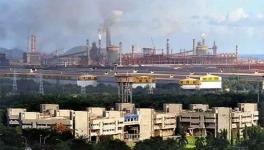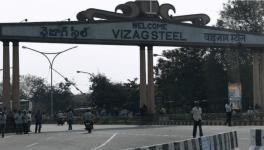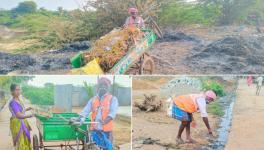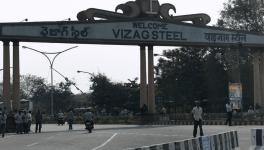COVID-19 in Rural India-XXXII: Impact of Lockdown on Mettavalasa Village in Andhra Pradesh
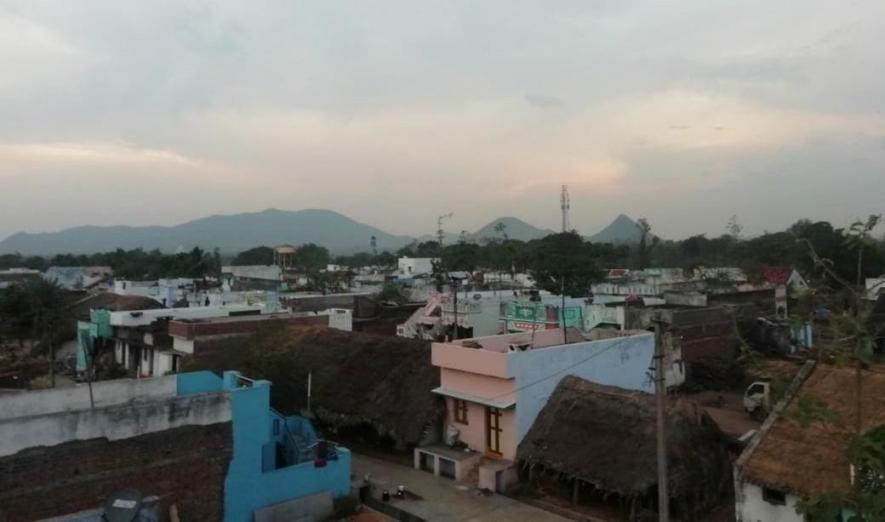
View of the village on a lockdown day evening; photo taken by respondent from house terrace.
This is the 32nd report in a series that provides glimpses into the impact of COVID-19-related policies on life in rural India. The series, commissioned by the Society for Social and Economic Research, comprises reports by various scholars who have been conducting village studies in different parts of India. This report is based on interviews conducted with several respondents from the village, including a woman factory worker, a mid-day meal worker, a small-scale, land owning farmer, a large-scale farmer and a poultry farmer. The interviews were conducted telephonically between April 15 and 18, 2020.
Mettavalasa is a village about 57 km north of Vizianagaram city in Vizianagaram district, Andhra Pradesh. The nearest town is Bobbili, about four km away.
As per the 2011 Census, the population of the village was 3,748, with the number of women exceeding that of men. According to the respondents, about 80% of the villagers belong to the Backward Classes (BC), and belong to the Kappu, Yadava, Koppalavelamlu, Telaga, Kurakkalu, Padmasali, and Settibaljeelu communities. These communities own about 70% of the land in the village. Castes like Karnalu, Brahman and Komatlu that fall into the general category account for about 15% of the population and these communities own about 5% of the land area. Castes such as Mala and Madika that fall into the Scheduled Castes (SC) category and castes such as Koniadorlu and Rellivalu that fall into the Scheduled Tribes (ST) category make up the remaining 5% of the population. These households mostly own government D-form patta lands, which make up the remaining 20% of the land area of the village. Also, there are about 500 agricultural labourers and factory workers from landless households.
The major crops grown in Mettavalasa are paddy, sugarcane, maize and cotton in the kharif season and paddy and vegetables during the rabi season. The village is near a designated Andhra Pradesh industrial development area, which is known locally as ‘growth centre’ and houses between 30 and 40 industrial units. Many workers from the village are employed in these industrial units.
Since the beginning of the lockdown in the last week of March, all factories in the industrial area near the village have ceased operating, but farming activities have continued to take place, on a relatively smaller scale than usual. Farmers in the village had completed last season’s harvest a few days before the lockdown, but most of them have had to store their harvests in their homes as, despite many farmers owning tractors, they have not been able to take their produce to the market. The respondents also reported that many farmers foresaw that the government’s supply of seeds would be delayed, and so had bought seeds from other farmers or are using seeds saved from last season. Local farm labourers make themselves available for work whenever needed; so, there is no shortage of labour at present. There is also no shortage of water for irrigation, as the village is well supplied by ponds and bore wells. Green fodder and crop residue from crops like maize are used as cattle feed; other cattle feed like rice bran is not available as rice mills are closed. Packaged cattle feed is supplied from milk procurement centres at the rate of one bag per farmer every 15 days.
The nearest market is at Bobbili and it is open from 6 am to 11 am every day during the lockdown period. However, as noted above, some farmers are unable to transport their produce. So, they have been forced to sell locally for lower prices—one farmer was reportedly even giving bananas away for free. The government is procuring paddy at the rates of Rs 18.30 per kg for grade 1 and Rs 18.15/kg for grade 2. Poultry prices have fallen, especially the price of broiler chicken, which sells at Rs 70 per kg now, whereas it would normally sell at Rs 100-150 per kg. Desi chicken, however, continues to sell at its usual price of Rs 350 per kg. Sales have fallen as poultry farmers are only able to sell within the village; outside buyers have not been coming to purchase chicken.
Typically, farm labour wage rates in the village are Rs 100 to 150 per day for women and Rs 200 to 250 per day for men. The daily wage rate on an average for factory workers is Rs 300 to 600 per day for skilled and semi-skilled migrant workers and Rs 300 to 350 per day for unskilled local labour. Migrant workers are usually paid monthly depending on the type of work they are engaged in and on the factories they are employed at. Most factory workers have not received any payment since the beginning of lockdown, and many migrant workers (around 200 to 250, according to my respondents) from Chennai, Vijayawada, and Orissa are stranded here. Most continue to stay in the accommodation arranged for them by their employers, while some have rented houses in villages around the growth centre. All industrial activity, including mining operations near the villages, has been stopped, leaving many workers unemployed.
Since the beginning of the lockdown in the last week of March, all factories in the industrial area near the village have ceased operating, but farming activities have continued to take place, on a relatively smaller scale than usual. Farmers in the village had completed last season’s harvest a few days before the lockdown, but most of them have had to store their harvests in their homes as, despite many farmers owning tractors, they have not been able to take their produce to the market. The respondents also reported that many farmers foresaw that the government’s supply of seeds would be delayed, and so had bought seeds from other farmers or are using seeds saved from last season. Local farm labourers make themselves available for work whenever needed; so, there is no shortage of labour at present. There is also no shortage of water for irrigation, as the village is well supplied by ponds and bore wells. Green fodder and crop residue from crops like maize are used as cattle feed; other cattle feed like rice bran is not available as rice mills are closed. Packaged cattle feed is supplied from milk procurement centres at the rate of one bag per farmer every 15 days.
The nearest market is at Bobbili and it is open from 6 am to 11 am every day during the lockdown period. However, as noted above, some farmers are unable to transport their produce. So, they have been forced to sell locally for lower prices—one farmer was reportedly even giving bananas away for free. The government is procuring paddy at the rates of Rs 18.30 per kg for grade 1 and Rs 18.15/kg for grade 2. Poultry prices have fallen, especially the price of broiler chicken, which sells at Rs 70 per kg now, whereas it would normally sell at Rs 100-150 per kg. Desi chicken, however, continues to sell at its usual price of Rs 350 per kg. Sales have fallen as poultry farmers are only able to sell within the village; outside buyers have not been coming to purchase chicken.
Typically, farm labour wage rates in the village are Rs 100 to 150 per day for women and Rs 200 to 250 per day for men. The daily wage rate on an average for factory workers is Rs 300 to 600 per day for skilled and semi-skilled migrant workers and Rs 300 to 350 per day for unskilled local labour. Migrant workers are usually paid monthly depending on the type of work they are engaged in and on the factories they are employed at. Most factory workers have not received any payment since the beginning of lockdown, and many migrant workers (around 200 to 250, according to my respondents) from Chennai, Vijayawada, and Orissa are stranded here. Most continue to stay in the accommodation arranged for them by their employers, while some have rented houses in villages around the growth centre. All industrial activity, including mining operations near the villages, has been stopped, leaving many workers unemployed.
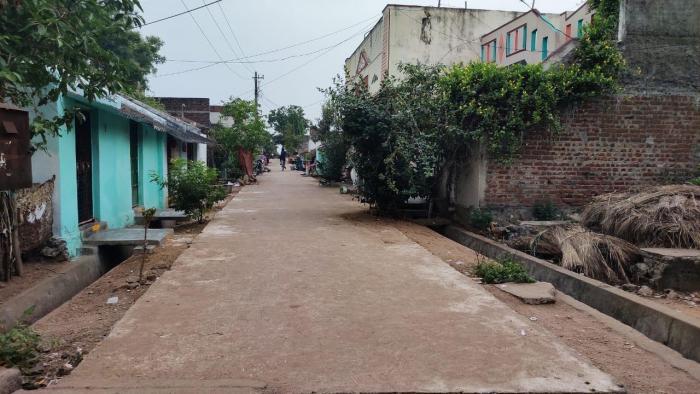
An interior road through the village; few villagers are seen sitting in front of their houses
MGNREGA work has also come to a halt during the lockdown. Persons with disabilities (PwD) are given priority for MGNREGA employment in the village, and work was supposed to start on April 13, but this was postponed. One respondent reported that most workers have received payment for the work they did under the scheme in January-February.
Fuel retail outlets are operational, and tractors and other vehicles required in farming operations are able to get fuel. The nearest bank and ATM facilities are at Bobbili. One respondent reported that although the supply of cash is low, most vendors are accepting mobile wallet and UPI payments. However, those who are running short of cash in hand may be in trouble if the lockdown is further extended.
Also read: COVID-19 in Rural India-XXIX: Impact of Lockdown in Seloo Taluka, Wardha
Impact of the lockdown
There are around 150 to 200 cows in the village. Milk procurement by a dairy plant located at Kasipet has continued during the lockdown. The price of milk has increased byRs 5 per litre during the lockdown, from Rs 35 per litre to Rs 40 per litre [farmers used to sell milk at Rs 25-30 per litre, but now they sell at Rs 30-35]. In the local shops, the prices of items like rice and pulses remain normal.
Vegetables are available within the village since they are locally produced and were harvested just before the lockdown began. The local police have been monitoring prices to ensure that hikes and hoarding do not take place, but vegetable and fruit prices at the local market have reportedly been affected nevertheless. On the one hand, the prices of brinjal, okra, onion and banana, all grown in the village, have fallen due to excess supply within the village, but on the other hand, the prices of fruit and vegetables that come to the village from outside have increased sharply (Table 1).
Price of fruit and vegetables, Mettavalasa Village
During the first few days of the lockdown, midday meals continued to be prepared and distributed by volunteers. Subsequently, this was stopped, but the 430 beneficiaries under the scheme now receive supplies of raw materials such as rice and eggs, instead. ASHA workers regularly visit all households to check up on people and spread awareness on hygiene and nutrition. Volunteers associated with grama sachivalayams or village secretariats are working, and an auxiliary nurse midwife (ANM) is on call to attend to medical emergencies. According to my respondents, the state government has provided monetary aid of Rs 1,000 per household, while Jan Dhan account holders received Rs 500 in their accounts from the central government. Community kitchens run by volunteers are providing food to stranded migrant labourers twice a day. Also, a small organisation named the Satya Sai Seva Samiti has supplied masks to several families in the village. Some respondents reported that since wine shops are closed, illicit liquor has begun to be smuggled in, and three persons have been arrested by the police in connection with this.
Even though the village currently has sufficient stocks of food and other essential supplies, the villagers are running out of cash. It remains unclear how many of the nearby industrial units will resume operations when the lockdown is lifted, and many of those involved in factory work are worried about job losses. Farmers worry that they will not be able to sell their harvests in time if the restrictions on transport and market operations are not lifted soon. No cases of COVID-19 have been reported in the district of Vizianagaram thus far, which the villagers see as a positive sign for the imminent lifting of the lockdown.
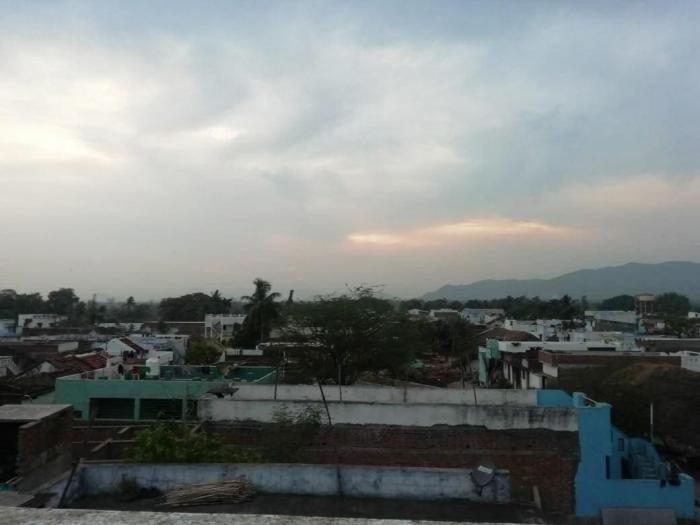
Another view of the village from the terrace.
Author is a young professional in the Rythu Sadhikara Samstha (RySS), an Andhra Pradesh-government owned not-for-profit engaged in natural farming. All photographs are by Laxmi, a farmer and midday meal worker in Mettavalasa and one of the respondents interviewed for this report.
Also read: COVID-19 in Rural India-XXX: Impact of Lockdown on Tea Plantation of Thettamala, Kerala
Get the latest reports & analysis with people's perspective on Protests, movements & deep analytical videos, discussions of the current affairs in your Telegram app. Subscribe to NewsClick's Telegram channel & get Real-Time updates on stories, as they get published on our website.










